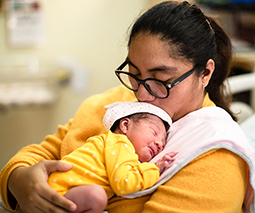4 contraceptive options to help you avoid getting pregnant (again)

Sex might not be on the menu now that you’re both sleep deprived new parents, but there will come a time when the mood strikes and it will be on again. For this reason though, it’s a very smart idea to have a contraception plan in place – in case you aren’t ready to give your new baby a sibling – just yet!
Now, before we delve into the various birth control options out there, it’s important to note that breastfeeding alone is not a bulletproof (well, sperm-proof) form of contraception. Indeed, we’ve all heard about the new mother who got pregnant a few months after giving birth.
Here are some contraception options available to you that do work, but chat to your doctor about what’s the best option for you.
1. Barrier methods
Barrier methods physically prevent sperm from reaching the egg. The good thing about them is they won’t affect your hormones, interfere with breastfeeding or have any real side effects. For this reason, they can be a good ‘in between’ birth control option before returning to your trusted method, or trying something new.
They include:
- Condoms – these can be male or female.
- Diaphragm – a dome-like device filled with sperm-killing spermicide cream that’s inserted into your vagina before sex. Your GP will need to fit it because even if you’ve had one before, you may need a different size after being pregnant and giving birth (yes, ‘down there’ might look different now).
- Cervical cap – this is a silicon cup that looks a bit like a sailor’s hat (ahoy!) and fits over your cervix. It gets filled with spermicide cream before being inserted into your vagina. You’ll need to wait at least 10 weeks after birth before using one.
Chat to your doctor about how effective these options are, as barrier methods may not be a recommended long-term contraception for you.

2. Hormonal options
There are various hormonal options available but all work to release synthetic hormones into your system. These hormones act to suppress ovulation, thin your uterine lining and thicken your cervical mucus to block sperm from finding the egg. Your doctor will recommend which is best for you as certain hormones can interfere with breastfeeding, affect post-birth bleeding and have other side effects. They may suggest you wait before using some forms.
- Hormonal rod – this is an implant (about 4cm long) that gets inserted under the skin of your arm and releases hormones into your system. While a small dose of hormones will pass on to your baby through breastfeeding, it does not affect your milk production and is considered safe during breastfeeding.
- The mini pill – an oral contraceptive that releases a small amount of progestin. It does require you to remember to take it everyday though (which might be a little tricky with baby brain!). It’s 91-99.7% effective in preventing pregnancy.
- The shot – this an injection of progestin every three months. Your doctor may advise you wait six weeks post birth before getting it. A very small amount of the dose is passed on to your baby through breastfeeding and it does not affect the amount of milk you produce.
- Combined pill – commonly known as ‘the pill’ this is an oral contraceptive that contains estrogen and progesterone. It is a three week on, one week off system with the one week off often being a ‘reminder’ pill that contains no hormones.
- The ring – also called a ‘birth ring’ this bendy ring is inserted into your vagina six weeks after birth. Once inside, the ring releases a continuous low dose of estrogen and progesterone. You have to insert a new ring every 28 days.

3. IUD
An Intra Uterine Device (IUD) is a T-shaped device that affects that works to stop sperm moving and surviving in your uterus. There are two types: copper and hormonal and both are fitted by a doctor at least four weeks after your baby is born. Hormonal IUDs act to make the fluid at the opening to the uterus thicker, which stops sperm from swimming through and can also affect ovulation by changing the hormones that cause you to release an egg each month. They last 5-10 years and can be removed when you want to try for another baby.
4. Permanent solutions
If you know your family is complete, then it might be time to have a chat with your partner about a vasectomy (‘the snip’). Having your tubes tied or a tubal occulasion surgery is something you’ll need to wait at least three months for after you’ve had your baby – chat to your doctor if this is a good option for you.









